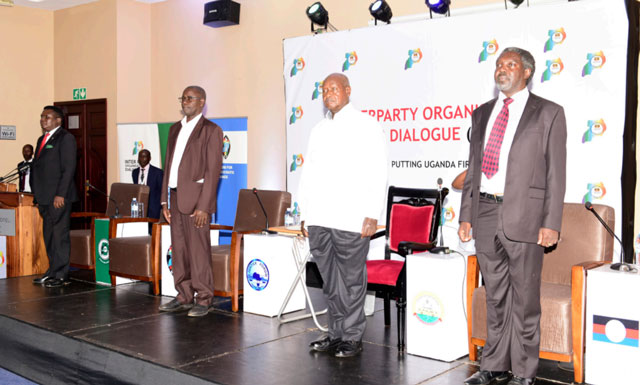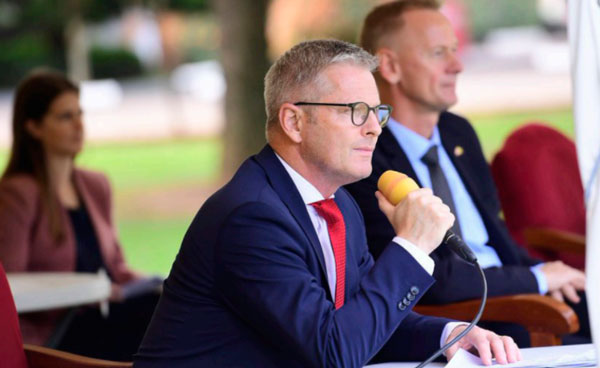
Will it herald DGF III or marks the closure of project?
NEWS ANALYSIS | THE INDEPENDENT | President Yoweri Museveni has given a small, five-month window to the Democratic Governance Facility (DGF), a major funder of civil society organisations in Uganda, to operate. But does that mean the end of DGF, whose activities were suspended last year, or is another strategy by the President to beat the NGOs into line?
Museveni announced the very conditional re-opening of DGF activities in Uganda on June 22.
“Today, I hosted the Danish Minister for Development Cooperation. We discussed a number of bilateral issues. I also agreed to lift the ban on Democratic Governance Facility (DGF), to run till December 2022, with Government represented in the decision-making structures,” Museveni said in a tweet.
“I shall formally communicate our position to the relevant government departments,” he added.
The lifting of the ban follows a protracted lobbying campaign, marathon meetings between government and development partners, and public campaigns.
At the meeting, the Danish Minister for Development Cooperation, Flemming Miller Mortensen, had informed the President that, in any case, the project has only six months left. The Danish Ambassador to Uganda, Nicolaj Abraham Petersen, attended the meeting.

The Democratic Governance Facility (DGF) was established in 2011 by the European Union, United Kingdom, Denmark, Ireland, Austria, Sweden, the Netherlands, and Norway to provide financial and technical support to both state and non-state actors in areas such as democracy, human rights, and rule of law.
In its send phase, which commenced in 2017, DGF II had a budget of 102 million Euros which irked Museveni. The money was contributed by the European Development Fund (EDF) 12 million Euros, Austria 2.5 million Euros, Denmark 20 million Euros, Ireland 14 million Euros, Netherlands 10 million Euros, Norway 10 million Euros, and Sweden 25 million Euros. It also had 8 million Euros carried forward from DGF I.
While approving funding for Phase two of DGF, the funders noted that Phase had demonstrated, considerable results in promoting and underpinning democratic governance, including constructive civil society engagement with government institutions, citizens’ understanding of their rights, stronger accountability through demand-side activities, and the provision of legal aid.
“Experience has shown that supporting citizen engagement with democratic processes and institutions has led to increased state responsiveness,” they said, “DGF II, building on these achievements, will not only be consolidating its efforts in supporting and strengthening civil society. It will also capitalise on opportunities towards increased engagement with the Government of Uganda to demonstrate the value of a governance programme which connects to the national priorities and commitments of the Government. DGF II aims at going beyond a mere “continuation” of DGF I.”
At the time, there was an understanding of the need to consolidate or scale up those areas of intervention which were successful in delivering evidence-based results from 2011 to 2016, phase out where DGF has been less successful, and seek new areas of intervention and partnerships.
The funders said DGF II programming would be based on a set of principles around identifying and contributing to the solving of local and national problems, ensuring regular learning, emphasising gender issues, and engaging a broad spectrum of actors around key governance issues.
The Bobi Wine factor
But on January 02, 2021, President Museveni ordered the suspension of DGF activities, stating that its funds were “used to finance activities and organisations designed to subvert (the) Government under the guise of improving governance.”
President Museveni was upset that DGF had been allowed to spend its budget of £100 million (Approx. Shs500.8 billion) to operate in the country without his involvement.
“It has come to my attention that the Ministry of Finance under the hand of the Permanent Secretary, irregularly and unilaterally authorized a £100 million fund, known as the Democratic Governance Facility, to be operated exclusively by a foreign mission in Uganda,” he wrote to the Ministry of Finance in a January 02, 2021 letter.
He said the Government of Uganda has no say or oversight on how the Democratic Governance Facility is administered in Uganda and contrasted it to the Democratic Governance and accountability project in which he said there was transparency and representation.
Museveni said he was informed that a big percentage of the DGF money went into financing activities and organisations meant to subvert government “in the name of the improving governance.”
President Museveni’s closure of DGF came at the climax of the 2021 presidential, parliamentary and local government elections where he face a stiff challenge from a debutante party, the National Unity Platform (NUP), led by Robert Sentamu Kyagulanyi aka Bobi Wine.
Bobi Wine and his NUP party, which was a successor to the People Power movement that had led opposition to the lifting of Presidential term limits to allow Museveni to run again, was at the time the darling of Western media. According to Museveni, the western adoration was matched with funding for NUP.
Museveni’s ban reportedly affected over 100 Non-Governmental Organisations. Most of these saw many of their projects come to a halt. The ban was, however, criticized by among others, the U.S. government funded democracy advocacy and research organisation; Freedom House.
Jon Temin, director of Africa programs at Freedom House said in a press release on February 04 that DGF is critical to the operations of many Ugandan civic organizations mandated to advance the rule of law and good governance and some government bodies, including the Uganda Human Rights Commission.
“We are alarmed by the decision to suspend the Democratic Governance Facility,” he said “Through this action, the government of Uganda is standing in the way of progress driven by Ugandans themselves.”
He pointed out that in the elections which was characterised by violence and suppression of the political opposition, Bobi Wine was arrested at a campaign rally for allegedly violating COVID-19 restrictions and over 50 people were killed as security forces sought to quash demonstrations sparked by Wine’s arrest. He noted how the government disrupted internet access nationwide, prompting the opposition to accuse the government of limiting its ability to share evidence of electoral fraud.
He said the government also prevented foreign observers from monitoring the contest , denied nearly all accreditation requests from Ugandan civil society organisations seeking to participate, and froze the bank accounts of several prominent organisations involved in election monitoring and good governance.
NGO shattered
At around the same time of Jon Temin’s press statement, the matter came up on the floor of Parliament.
Kawempe North MP, Latif Sebaggala presented it as a matter of national importance on February 04, 2021. He said Museveni’s action would “deal a heavy blow to the efforts of DGF in fighting corruption and empowering communities around the country”.
Sebaggala said President needed to have done due diligence about DGF’s support to communities and livelihoods of people instead of focusing on allegations of the Fund sabotaging the government.
“There are a number of non-governmental organisations that are being funded by DGF and so many Ugandans have been employed by these NGOs to execute their activities,” he added.
Sebaggala also said that the President should not blame DGF for NRM’s loss in the central region following claims that the Fund has been supporting activities located in the region.
Bugiri Municipality MP, Asuman Basalirwa said that political parties; including the NRM have been beneficiaries of funding from DGF through the Inter-Party Organisation for Dialogue (IPOD).
“The President’s move stifles his own party,” Basalirwa said.
Kumi Municipality MP, Silas Aogon said even government institutions like Parliament were affected by the presidential directive to halt DGF activities. He said the activities of parliament’s Government Assurances Committee were being directly funded by the DGF.
“This puts the Committee’s activities in jeopardy,” he said.
At the time, then-Speaker of Parliament Rebecca Kadaga directed the Prime Minister to present a statement to Parliament.
It remains unclear if President Museveni’s lifting of the ban, albeit for five short months, will herald DGF III or it marks the closure of a project which has been the heartbeat of democracy in Uganda.
 The Independent Uganda: You get the Truth we Pay the Price
The Independent Uganda: You get the Truth we Pay the Price



The ban should be reduced.
“We are alarmed by the decision to suspend the Democratic Governance Facility,” he said “Through this action, the government of Uganda is standing in the way of progress driven by Ugandans themselves.” The director of US Freedom House has summed up the feelings of many Ugandans that the government is in the way of progress under the guise of tired ideology over common sense/reality.